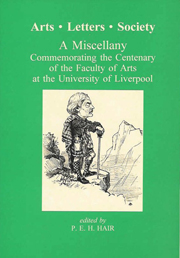 Arts - Letters - Society
Arts - Letters - Society Book contents
- Frontmatter
- Contents
- Introduction
- Preface
- PART 1 I REMEMBER ..
- PART 2 ESSAYS INFORMATIVE AND CRITICAL
- The Claims of the Arts Faculty
- The Buildings of the Faculty of Arts
- How a Redbrick Arts Faculty Worked
- The Humanities in a Technological Age
- The Real Mackay
- The Once and Future Faculty
- APPENDIX
- List of Illustrations
- Index
- Plate section
The Once and Future Faculty
from PART 2 - ESSAYS INFORMATIVE AND CRITICAL
- Frontmatter
- Contents
- Introduction
- Preface
- PART 1 I REMEMBER ..
- PART 2 ESSAYS INFORMATIVE AND CRITICAL
- The Claims of the Arts Faculty
- The Buildings of the Faculty of Arts
- How a Redbrick Arts Faculty Worked
- The Humanities in a Technological Age
- The Real Mackay
- The Once and Future Faculty
- APPENDIX
- List of Illustrations
- Index
- Plate section
Summary
The University had three Faculties in the beginning: Arts, Science and Medicine. Over the years we acquired yet more: Law, Engineering, Veterinary Science, Social and Environmental Studies, and Education. Education has shrunk again to a Department, and joined Social and Environmental Studies. There is talk of merging Engineering with the Physical Sciences, and letting the Life Sciences loose. Sometimes it seems that Arts must be a poor relation, or a gaggle of departments left behind as others seek their own way in the world. After the Faculty was divided, back in 1971, ‘the rump Arts’ were left to call themselves the Faculty, because anything that could be settled by numerical or experimental means had been hived off to SES (whence, in its turn, Psychology seceded into Science). Are we merely what's left, as wiser people manage to find ways of settling things for real (or at least to the satisfaction of established thinkers)? Might Archaeology join Earth Sciences; Music join Engineering; Languages and Linguistics join Education or Psychology; Philosophy be torn apart to join Computer Science, Physics, Psychology, Political Theory; History (Ancient, Medieval and Modern) turn wholly Economic? At the end the ‘rump Arts’ might be only literary: an excuse for reading entertaining fiction, and adorning it with critical gloss and reminiscence that no-one ever will prove ‘wrong’. Maybe a few musicians and musicologists, and even some art critics, could join that rump: their brief, to entertain and train new entertainers – till that task too is taken over by technologists. Maybe the rest of us will somehow survive to teach ‘Contemporary Studies’ for journalists and business people: nothing written before five years or so ago will have much importance.
- Type
- Chapter
- Information
- Arts - Letters - SocietyA Miscellany Commemorating the Centenary of the Faculty of Arts at the University of Liverpool, pp. 213 - 224Publisher: Liverpool University PressPrint publication year: 1996
